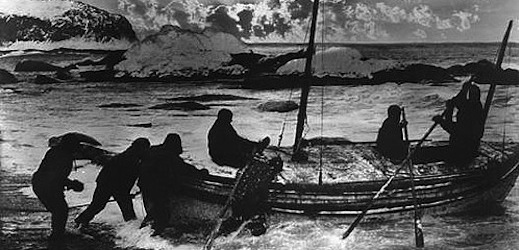Master Navigator of Southern Seas

Called ‘the greatest navigator of all times”, Frank Worsley was born on February 22, 1872 in Akaroa, New Zealand.
He was Ernest Shackleton’s captain on the epic Endurance Antarctic expedition of 1914-1917. It was Worsley who is credited with saving the crew of this expedition, when he navigated the little 22 foot long lifeboat James Caird, from Elephant Island to South Georgia, on a 16 day perilous journey of some 800 nautical miles, through rough seas, after the crew lost their ship Endurance in harsh Antarctic conditions a few months earlier.
Without the incredible navigational and seamanship skills of Worsley, many believe that most, if not all, of the 28 men of the Endurance expedition would have died.
Growing up in Akaroa, Worsley lost his mother when he was 2 years old.
His father remarried and moved to Christchurch in 1883 and Worsley went to school in Fendalton. Later he entered the navy and a lifelong passion for the sea began.
Worsley served on different vessels in the Merchant Navy and went back to the Royal Navy Reserve in 1906. By 1914, he held the rank of Lieutenant Commander.
In the same year, Worsley applied for a position In Ernest Shackleton’s Imperial Trans Antarctic Expedition.
Shackleton’s plan was to cross the Antarctic from the Weddell Sea to the Ross Sea. It was hoped this would bring Britain glory in the South Pole after the tragic end of Robert Falcon Scott in 1912, when his rival, Roald Amundsen, a Norwegian, was the first to reach the South Pole in December 1911.
The ship Endurance was, however, crushed in ice and sank, forcing the crew of 28 to drift on a floating ice sheet for six months until the floe broke up. They used three lifeboats which Worsley navigated over seven days to Elephant Island.
From Elephant Island, Shackleton knew there was only one way to survive; they had to organise a rescue mission, by first reaching the whaling station on South Georgia.
He took Worsley as navigator on the best of the lifeboats, the James Caird. Six men were on board and they reached South Georgia. Three companions were so exhausted they could not risk forcing them to go over the mountains to reach the whaling station, which was on the opposite side to where they had landed.
Worsley, Tom Crean and Shackleton undertook the dangerous hike and reached the station. Three months later all the men on Elephant Island were rescued.
When Worsley returned to Britain in 1917, he rejoined the Royal Navy Reserve. A year later he was on loan to the War Office and worked alongside Shackleton again, this time in Russia.
After the war, Worsley bought a schooner and traded in the Baltic. He was poor at business and lost most of his fortune, but he was a gifted lecturer and author and made some money from this.
Worsley was married twice and his second wife accompanied him on many of his journeys. When World War Two began, he Iied about his age, to be young enough to join active service again.
When this was discovered, he was dismissed from service and instead, he accepted a position as instructor at Greenwich Naval College, where he remained until his death in 1943. He was honoured with a formal naval memorial service. He received the Polar medal. A mountain is named after him in South Georgia and an icefall near the Nimrod Glacier.
Exhibition
The Akaroa Museum features an exhibition on Frank Worsley called “Salute to Adventure”. It covers his key role in Shackleton’s 1914-1917 Antarctic expedition, his subsequent participation in World War One, the lecture circuit he developed to share his Antarctic stories and to provide him with some income, his writing, his treasure-hunting in the Caribbean in the mid-1930’s, and his attempts to gain command of a vessel and participate in World War Two in 1939, by which time he was 69 and too old for active service.
Akaroa is 75kms from Christchurch, set on a picturesque sheltered harbour and now a popular destination for cruise ships, as an alternative to Lyttelton.
Author: Dr Ursula Rack who is a polar historian and an Adjunct Fellow of Gateway Antarctica (University of Canterbury) and a member of the Canterbury branch of the Antarctic Society
Source: Captain Frank Pickering, Sydney Branch
